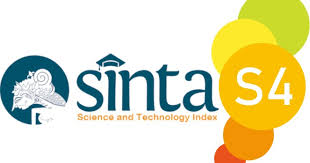MENINGKATKAN HASIL BELAJAR IPA MELALUI MODEL PROBLEM BASED LEARNING (PBL) PADA SISWA KELAS IV SDN 04 IX KOTO
Abstract
The learning model is an alternative that is used by teachers to deal with knowledge transfer activities so that it is easily accepted by students, so that learning becomes meaningful. The learning model can be chosen by the teacher by taking into account the characteristics of the learning material and the condition of the students. The results of the researchers' initial observations in March, namely in grade IV SD Negeri 04 IX Koto, that science teaching teachers until now still apply teacher centered with a delivery system that is dominated by teachers. Students tend to be silent, passive and less daring to express their ideas. Creativity and independence are hampered and even do not develop because the experience gained by students in the learning process is very limited so that they cannot develop the skills they have. Ideally, fourth grade elementary school students can create and try to find new things and get used to thinking in learning science. Because most teachers give examples before asking students to work on the problem. Students should be given the opportunity and trust to solve problems, especially in science subjects through the experience they have gained with the creative potential that each student has independently. The results of interviews showed that there were still many students who got daily test scores for the subject matter of style science lessons under the Minimum Completeness Criteria (KKM) with the KKM standard score, 33% (5 students) finished studying, while 67% (10 students) not finished studying.
Downloads
References
Ariyanto. 2011. Pembelajaran Aritmatika Sekolah Dasar. Surakarta: Penerbit Qinant.
Atmojo. 2013. Penerapan Model Pembelajaran Berbasis Masalah dalam Peningkatan Hasil Belajar Pengelolaan Lingkungan. Jurnal Kependidikan 43(2), 134-143.
Baharuddin. 2015. Teori Belajar & Pembelajaran. Yogyakarta: Ar-ruzz Media. Baharudin & Nur Wahyuni, Esa. 2015. Teori Belajar dan Pembelajaran.Yogyakarta: Ar-Ruzz Media
Daryanto. 2011. Penelitian Tindakan Kelas dan Penelitian Tindakan Sekolah: Beserta Contoh-co ntohnya. Yogyakarta: Gava Media.
Daryanto. 2012. Konsep Pembelajaran Kreatif. Yogyakarta: Gava Media. Herawati. 2018. Memahami Proses Belajar Anak. Jurnal Volume IV. Nomor 1.Januari – Juni, Dosen UIN Ar-Raniry Banda Aceh.
Najma. 2017. Penerapan Model Problem Based Learning (PB) dalam meningkatkan hasil belajar siswa pada tema selalu berhemat energi kelas IV MAN 3 Banda Aceh”. Jurnal Volume IV. Nomor 1. Januari – Juni, Dosen UIN Ar-Raniry Banda Aceh.
Nurdin, Mohamad. 2013. Belajar dengan Pendekatan Pailkem. Jakarta: Bumi Aksara.
Rahayu, Rina. 2015. Pengembangan Perangkat Pembelajaran IPA Berbasis Problem Based Learning Di SMP. Jurnal Kependidikan. Vol 45, No.1. Yogyakarta.
Rusman. 2012. Belajar dan Pembelajaran Berbasis Komputer Mengembangkan Profesionalisme Guru Abad 21. Bandung: ALFABETA.
Rusmono. 2012. Strategi Pembelajaran dengan Problem Based Learning itu Perlu: untuk meningkatkan Profesionalitas Guru. Bogor: Ghalia Indonesia.
Rusmono. 2012. Strategi Pembelajaran Problem Based Learning untuk Meningkatkan Profesionalitas Guru. Bogor: Ghalia Indonesia.
Sani, Ridwan Abdulah. 2015. Pembelajaran Saintifik untuk Inflementasi kurikulum
William Janes, John Dewer, James Cattel, Edward Thorndik th 1890-1900.
Copyright (c) 2022 YENDRA MAIROZA, S.Pd

This work is licensed under a Creative Commons Attribution 4.0 International License.













